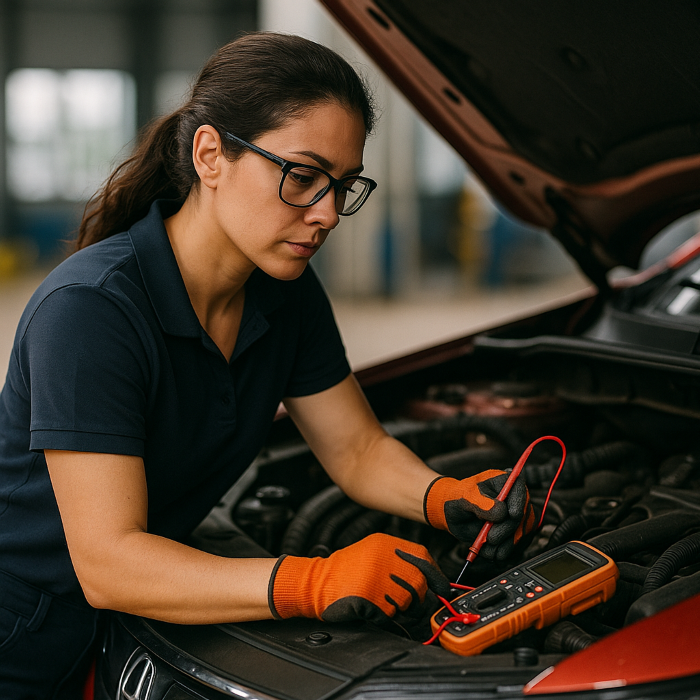
Automotive electrical technicians are the specialists behind the brains of modern vehicles. As cars become smarter, safer, and more electrified, these technicians diagnose and repair the intricate electrical and electronic systems that power everything from ignition systems to advanced driver-assist technology. In this role, you're not just a mechanic — you're a technician, a troubleshooter, and an integral part of the next generation of automotive innovation.
• Diagnose faults in vehicle wiring, computers, batteries, charging systems, and lighting
• Repair and replace damaged electrical components, wiring harnesses, and control modules
• Install aftermarket accessories like audio systems, alarms, GPS trackers, and dash cams
• Calibrate sensors, cameras, and autonomous driver assistance systems
• Perform battery health checks and work with hybrid/electric vehicle systems
• Use advanced diagnostic scanners, oscilloscopes, and software tools to troubleshoot faults
• Maintain detailed service records and uphold safety standards when working with high-voltage systems
Begin with an automotive apprenticeship while completing the nationally recognised Certificate III in Automotive Electrical Technology (AUR30320). Some technicians start as general mechanics before specialising, but many dive directly into electrical work due to the strong demand for skilled auto electricians.
Training generally takes 3–4 years through an apprenticeship that blends paid workshop experience with structured study through a Registered Training Organisation (RTO).
• Strong logical thinking and problem-solving skills
• A passion for technology and how electronic systems work
• High attention to detail and methodical work habits
• Patience when dealing with complex diagnostics
• Safety-first mindset, especially when working with high-voltage systems
• Willingness to continually upskill as vehicle technology evolves
$75,000–$128,000/year — with even higher earning potential for those who specialise in EVs, advanced diagnostics, mining or commercial fleet support.
As you develop expertise, you can step into roles like diagnostic specialist, high-voltage EV technician, or advanced driver-assistance system (ADAS) calibrator. There are also opportunities to work with EV manufacturers, fleet management companies, or progress into workshop leadership and technical training roles.
Primarily weekday hours, though roles supporting fleets or heavy industry may involve after-hours breakdown support or on-call rotations.
Workshops, dealerships, and mobile service environments equipped with diagnostic computers, insulated tools, and specialised EV safety gear. Auto electrical technicians often split their time between vehicle interiors, engine bays, and diagnostic terminals.
• Certificate III in Automotive Electrical Technology (AUR30320)
• Valid driver’s licence
• Strong understanding of electrical safety procedures
• Confidence with both manual and computer-based diagnostics
Outstanding demand. As vehicles incorporate more electronics and hybrid technology, skilled auto electricians are critical to the future of the automotive industry. EV adoption and ADAS growth are driving even greater need for tech-savvy specialists.
You get to work with cutting-edge technology, solve challenging problems, and stay ahead of one of the fastest-evolving fields in automotive. No two faults — or vehicles — are ever quite the same.
Visit our Job Opportunities section to find vacancies near you and check our our Employers of Choice.